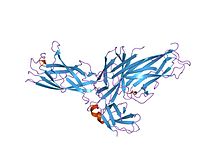In molecular biology, Caf1 capsule antigen proteins are a family of the F1 capsule antigens Caf1 synthesised by Yersinia bacteria. They adopt a structure consisting of a seven strands arranged in two beta-sheets, in a Greek-key topology, and mediate targeting of the bacterium to sites of infection.[1]
| Antig_Caf1 | |||||||||
|---|---|---|---|---|---|---|---|---|---|
 x-ray structure of the ternary caf1m:caf1:caf1 chaperone:subunit:subunit complex | |||||||||
| Identifiers | |||||||||
| Symbol | Antig_Caf1 | ||||||||
| Pfam | PF09255 | ||||||||
| InterPro | IPR015335 | ||||||||
| SCOP2 | 1p5v / SCOPe / SUPFAM | ||||||||
| |||||||||
References
edit- ^ Zavialov AV, Berglund J, Pudney AF, Fooks LJ, Ibrahim TM, MacIntyre S, Knight SD (May 2003). "Structure and biogenesis of the capsular F1 antigen from Yersinia pestis: preserved folding energy drives fiber formation". Cell. 113 (5): 587–96. doi:10.1016/S0092-8674(03)00351-9. PMID 12787500. S2CID 14850161.